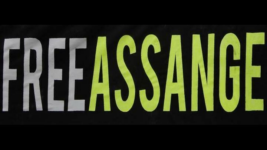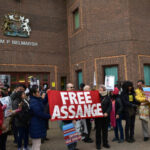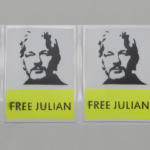A Glimmer of Justice for Assange Sparks Speculation There’s End in Sight

“It was such a victorious moment, to finally – to finally get a glimpse of hope into this case, and a glimpse of victory,” said WikiLeaks editor-in-chief Kristinn Hrafnsson following the recent decision in the Assange extradition case. “I think it is a turning point for the entire fight.”
Hrafnsson was referring to the UK High Court decision delivered on Monday, which saw judges Victoria Sharp and Jeremy Johnson permit Australian journalist and publisher Julian Assange to have another shot at appealing the June 2022 UK decision to greenlight his extradition to the US.
Hrafnsson comments regarding the “glimpse of victory” can be contrasted with those he made at a press conference late last week, in which he condemned the processes of the British courts as “corrupt” and further insisted that the extradition proceedings have been “rigged against Julian”.
So, this week’s decision wasn’t necessarily expected. Indeed, Julian’s wife, Stella Assange, told those at the 15 May presser that past UK extradition approvals have seen removal within 24 hours. And in a case with its first hearing having occurred in early 2021, many thought Julian’s time was up.
But rather than watching her husband being dragged away, Stella was able to remark afterwards, that “the judges have made the right decision” in allowing Julian to appeal once more, and she then made clear that “the United States should read this situation and drop this case right now”.
To fight another day
Monday’s ruling boiled down to whether assurances that the US had provided to the court on 16 April, in regard to three grounds of appeal that the pair of High Court justices had identified in March, as having “a real prospect of success” if permitted to be put to the court.
Assange’s lawyers raised nine grounds of appeal during two days of hearings in February, with the judges then determining that three of his points held weight, and it permitted the White House to provide assurances that would render these grounds a nonissue or they could then be appealed.
The grounds of appeal involved Assange’s right to free speech being protected under the US First Amendment, that he wouldn’t be denied this protection due to his being an Australian and not a US citizen, and that he won’t be charged once in the US with an offence carrying death.
The US provided diplomatic note number 601 to the High Court last month, and it asserted that “Assange will have the ability to raise and seek to rely upon” the First Amendment, and “that the death sentence will neither be sought nor imposed on Assange”.
Assange’s lawyer Jennifer Robinson, however, explained last week that the issue with the assurances is that there’s a body of case law in the US that permits foreign nationals to raise the First Amendment, but then denies them that right, and the assurances leave this possibility open.
And it appears that the High Court agreed that the US had left the path open for the WikiLeaks founder to have his right to free speech denied by a US court, on the grounds that he is a foreign national or for any other reason it might find to do so.
Let’s get Assange
As for the court, the June 2020 superseding indictment, was issued in the Eastern District of Virginia District Court, which has jurisdiction over Northern Virginia, where the bulk of US intelligence agencies are headquartered, including the CIA. So, the jury will be sourced from this suspect pool.
Stella noted at the time of the February appeal that former US state secretary Mike Pompeo wants to see her husband murdered, because in 2017, he released the details of the CIA’s hacking manual Vault 7, which was when the US official was CIA director, so it was not a good look for him.
Pompeo and our former PM Scott Morrison are besties these days, and the now colleagues in AUKUS-related military venture capital were evidently in the courting stage back then. And our ex-leader did nothing to assist Assange, when he was gaoled in 2019 and the US began proceedings.
The US too provided assurances in early 2021, soon after it was initially determined not to extradite based on mental health grounds. At that time, it guaranteed not to lock Julian up in the harshest US gaol pretrial, or under its most severe conditions, unless he did something else to warrant that.
The indictment contains eighteen charges laid against the Townsville-born son: seventeen of these are espionage offences, questionably laid against a foreign national, along with one count of computer hacking.
Then US president Donald Trump determined to get Assange in 2017, following the Vault 7 leak and despite the Obama administration deciding not to. And the extradition case is based on Assange having published around 70,000 classified US government files circa 2010, which were leaked to him.
A prime time to back out
So, as the decision of the court stands, Assange can now appeal extradition on the two grounds that relate to the First Amendment and the potential for a US court to rule against him on this. And it should be remembered, as Robinson pointed out, there’s precedent to show this.
But the UK courts have now queried the US case. And as Stella said, it would be an ideal time to drop it. The lawyer also pointed out that she considers that the Independent MP Andrew Wilkie-brought motion calling on the case to be dropped had been crucial in shifting potential case outcomes.
The Valentine’s Day motion was raised in the lower house just days before the February appeal hearings, and it saw two-thirds of Australian parliament calling for Assange’s release, with both the prime minister and the leader of the opposition in support of it.
Last August when state secretary Antony Blinken basically told Australians to suck it up in regard to Assange’s prosecution, the US was in a much stronger position than it is now, after the globe has watched president Joe Biden funding a genocide upon the Palestinians of Gaza for eight months.
The US president is now facing an election in November and his divisive contender Donald Trump is seen as having a good chance because of the backlash against Gaza, and the head of the US state is not pulling back on funding the massacre either, rather he’s denying it’s genocidal.
So, Biden may well be contemplating the further loss that prosecuting Julian could bring. And he did say last month that he’d been considering dropping the matter, which was understood to be a tip of his hat to the Australian parliamentary call that included the support of both major party leaders.
“This case should just be abandoned,” Stella said, following the delivery of the decision to let her husband appeal last Monday. “The Biden administration should have dropped it from day one. But now is the right moment for the Biden administration to drop it.”
“So, please, those in the United States who are in a position of power to make a decision, please just drop this case now,” she asked in conclusion. “Don’t let this go on any longer.”







